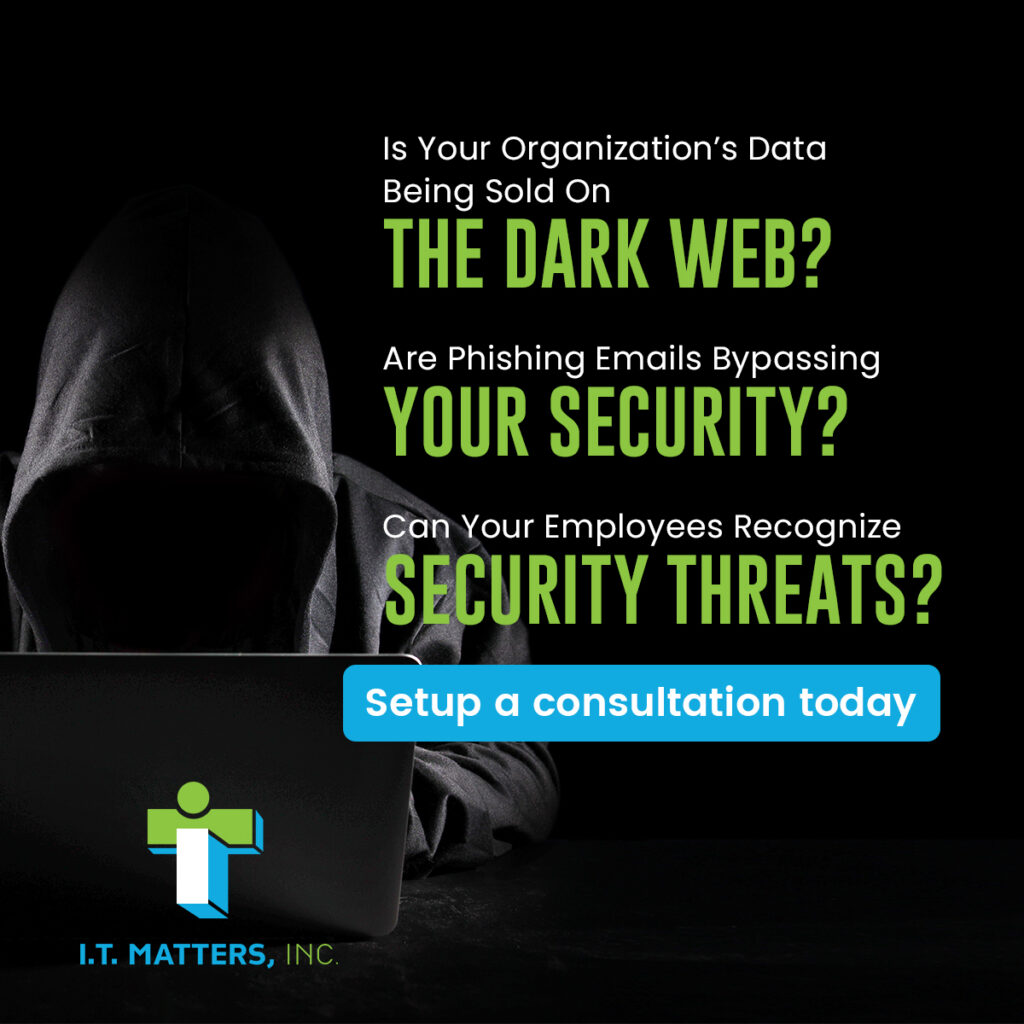Are you worried your business data may be for sale online?
If you’ve ever experienced a breach (whether you know about it or not), your passwords and other private data may be posted on the dark web. It’s important to confirm this by having a team of cybersecurity professionals like I.T. Matters finds out for you.
Is Your Data On The Dark Web?
It can be difficult for the average user to access the dark web and find the right sites to see if your info is for sale. After all, there’s no Google for that part of the Internet.
That’s why you need the right help, and the right technology to figure out if your data is for sale.
There’s only so much you can do on your own. Accessing and exploring the dark web is complicated and dangerous.
Fortunately, there are now more direct ways of checking whether your data has been compromised on the dark web. I.T. Matters is proud to offer cyber-surveillance monitoring solutions that can scan the dark web for your credentials.
How Does Your Data End Up On The Dark Web?
Probably because you or one of your employees gave it up in the first place. More often than not, cybercriminals will trick their target into giving up their information. The following strategies all fall under “social engineering”: the use of deception to manipulate individuals into divulging confidential or personal information that may be used for fraudulent purposes.
A few social engineering strategies they might use include…
- Phishing: Phishing emails are sent to large numbers of users simultaneously in an attempt to “fish” sensitive information by posing as reputable sources; often with legitimate-looking logos attached.
- Spear Phishing: This is a much more focused form of phishing. The cybercriminal has either studied up on the group or has gleaned data from social media sites to con users.
- Social Media Research: LinkedIn, Facebook, and other venues provide a wealth of information about organizational personnel. This can include their contact information, connections, friends, ongoing business deals, and more.
Are You Vulnerable To Phishing Attacks?
Phishing (and all social engineering techniques) is about the element of surprise.
It’s a method in which cybercriminals send fraudulent emails that appear to be from reputable sources in order to get recipients to reveal sensitive information and execute significant financial transfers.
You should have cybersecurity measures in place, but that doesn’t mean a phishing email won’t be able to slip past your inbox filters. Your staff members have to play a role in your cybersecurity as well.
If the cybercriminal can make you believe that they’re your bank, your boss, or a close friend, then you’re that much more likely to download malware or give up your SSN. That’s why your staff needs to know what to look for…
How To Spot A Fake Email
Check The Right Fields
If you’re unsure about an email, check the details on the email itself—specifically the “mailed-by” and “signed-by”, both of which should match the domain of the sender’s address.
Suspicious Links
Always be sure to hover your mouse over a link in an email before clicking it. That allows you to see where it actually leads. While it may look harmless, the actual URL may show otherwise, so always look, and rarely click.
Spelling and Grammar
Modern cybersecurity awareness comes down to paying attention to the details. When reading a suspicious email, keep an eye out for any typos or glaring errors. Whereas legitimate messages from your bank or vendors would be properly edited, phishing emails are notorious for basic spelling and grammatical mistakes.
Specificity
Another point to consider is how vague the email is. Whereas legitimate senders will likely have your information already (such as your first name) and will use it in the salutation, scammers will often employ vaguer terminology, such as “Valued Customer”—this allows them to use the same email for multiple targets in a mass attack.
Urgent and Threatening
If the subject line makes it sound like an emergency—”Your account has been suspended”, or “You’re being hacked”—that’s another red flag. It’s in the scammer’s interest to make you panic and move quickly, which might lead to you overlooking other indicators that it’s a phishing email.
Attachments
Phishers will often try to get you to open an attachment, so, if you see an attachment in combination with any of the above indicators, it’s only more proof that the email is likely part of a phishing attempt.
Can Your Staff Members Spot Security Threats?
In the end, the key to phishing methodology is that it doesn’t rely on digital security vulnerabilities or cutting edge hacking technology; phishing targets the user, who, without the right training, will always be a security risk, regardless of the IT measures set in place.
The key to truly comprehensive cybersecurity is simple, yet often overlooked: the user. The best cybersecurity technology and practices in the world can be undone by one staff member who doesn’t understand how to use them, or how to protect the data they work with.
The good news is that you don’t have to handle cybersecurity training for your team by yourself—I.T. Matters is here to help. We offer a comprehensive employee Cyber Awareness Training program that combines regular online training, simulated phishing attacks, and dark web monitoring.
With our help, your staff will contribute to your cybersecurity, not compromise it.

Would you like to reduce frustrations with technology and boost operational efficiency within your business? The I.T. Matters team partners with companies of various sizes to help you create a secure, scalable, and flexible technology infrastructure.
Exceptional customer service is at the foundation of everything we do – ensuring that IT projects fully align with your business goals. Our friendly and knowledgeable team continually reviews industry trends and government regulations to help reduce risk and create a more productive IT environment for your business. Whether you are looking for full-service, outsourced IT infrastructure support, or simply need help with an upcoming technology project, contact us to help!

